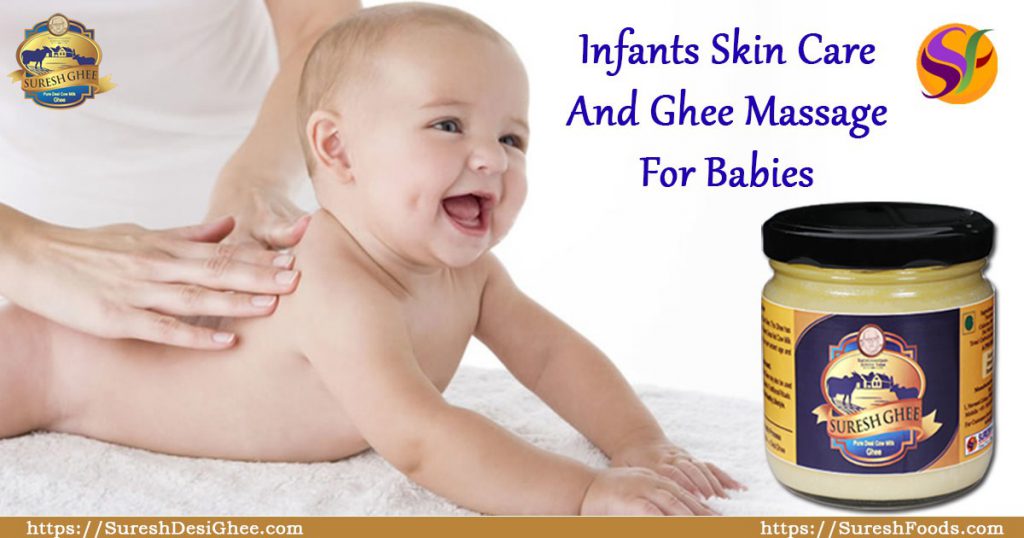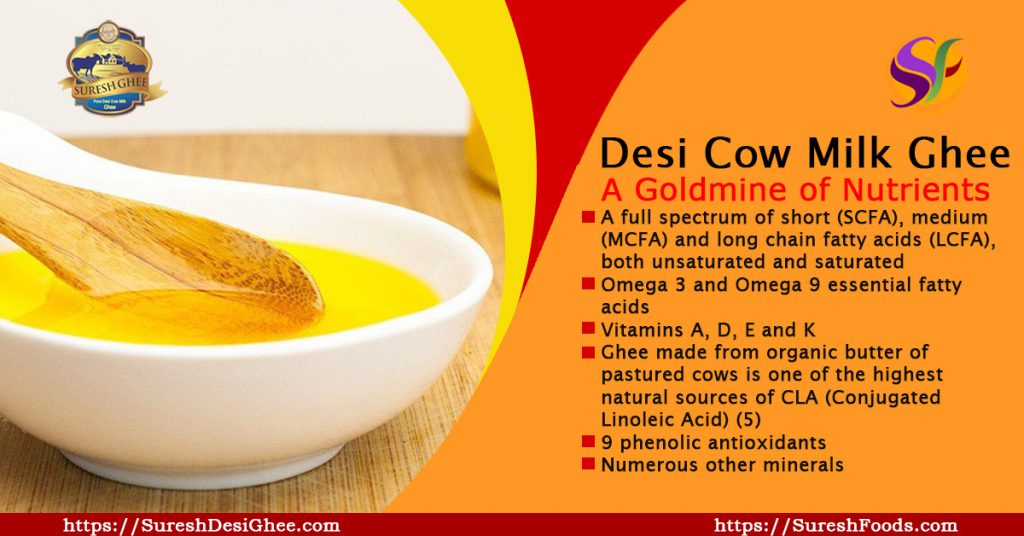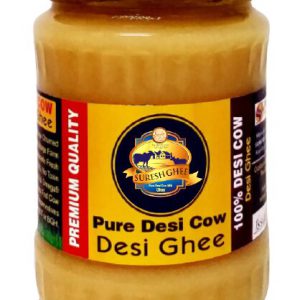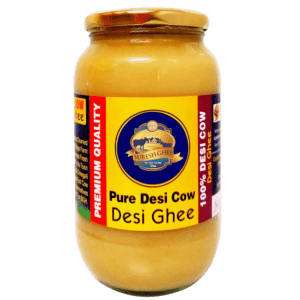When it comes to giving anything to our newborn, as a mother we get extra conscious and try it before we can actually apply to our new child. Desi Cow ghee has been in the picture since our birth. At every stage of life, our elders make us count the benefits and nutrition of Desi Ghee. However, for newborns, ghee usages are limited to massage them. We can induce ghee into their diet only after 6 months.

Buy cow Ghee Online: Order Now. Free Shipping
Using Desi Ghee as Massage Oil for Newborns:
I am sure you all will agree that our parents and grandparents emphasize using Desi Ghee in our daily life for many reasons. When it comes to – using ghee for baby’s massage, they always advise to have them from their kitchen- because they say we use purest things in our kitchens only. Things come from nature. Since a new bone will take time to adjust outside his/her mother’s womb, we should & must start with natural remedies.
The basic reason they advise using ghee for massage is that newborn skin is very delicate and they have very soft bones and nerves too. Using ghee while massaging makes the hands moment easier and prevent rashes on the skin, which could occur due to your rough hands and fingers. However, they suggest a ghee option for baby massage according to baby skin and weather conditions.
They mostly advise baby massage with Desi Cow Ghee, because of its medicational properties. However, depending on the weather and geographical circumstances Mustard Oil, Coconut Oil and Almond Oil are easily available in Indian kitchens. There could be instances where you see these oils mix with other oils and herbs for better results.
Only Pure Desi Cow Ghee is suggested for baby massage as it is lite in nature and easily absorbable by baby skin. If your baby skin is itchy, red and swollen, the anti-inflammatory property of the ghee will help in the treatment of eczema.
During the winter season, especially in high altitudes and cold areas, ghee is used to massage the baby, because ghee massage will give a better blood circulation and growth of the infant. Cow Ghee works miracles on dry skin.

Introducing Ghee in Baby’s diet:
Do you want your baby to eat nutritious Indian food? Have you thought about including desi ghee (clarified butter) in baby’s diet? Are you worried that it may affect baby’s health adversely? If this sounds like you, or someone you know, read this post. Here, look at some amazing health benefits of best ghee for babies and why you should include it in your baby’s diet!
Till the age of 6 months, breast milk is the premium and complete source of nourishment for an infant. But as the baby grows he needs more than just breast milk – for his development and optimum growth. After completing 6 months of age, an infant tends to lose the fat content of the breast milk that was earlier offered, and ghee can be an excellent way to cover up for the loss.
Why Include Ghee In Your Baby’s Diet?
Your growing baby needs almost 1500 calories per day for optimum growth and development. Feeding ghee to your kid is one of the easiest ways to boost his calorie intake and keep him energetic and active.
30 to 35 percent of the calories that your growing baby requires come from fats. After you stop breastfeeding your baby, he may subsequently start losing weight. It is just because he may not get a regular dose of fats, which he had earlier through the breast milk. To control fat deficiency, introduce ghee in his diet to maintain his fat intake per day.
Desi Ghee is a golden potion as stated in the main Ayurvedic book called Charaka Samhita where the other prescribes it to those who require strength or those who are weak. Desi Ghee contains optimum amounts of energy, proteins, saturated fats, and vitamins essential for the growth of a baby. Apart from this, desi ghee obtained from Vedic methods have anti-fungal, anti-bacterial, antiviral, and antioxidant properties which help your baby to have good eyesight, digestion, immunity as well as in the growth of the baby.
From the sixth month, the baby starts to become active. The baby starts crawling, creeping, sitting, recognizing colors and people, etc and these are the major months of growth and brain development for him and this stage is aided by a nutrient called DHA i.e., Docosahexaenoic Acid. DHA for infants are the most crucial nutrients to boost their brain development and it is said that infants can make their DHA from essential fatty acids in their diet. Desi Ghee as already said contains good amounts of saturated fats thus helps in the brain development of the infant by providing the required amount of DHA.
Some Of The Health Benefits Of Ghee For Babies Are:
1. Easy To Digest:
Ghee is full of saturated fatty acids, and they are easily digestible. Kids are unable to digest red meats or other fat foods. Desi cow ghee is one of the simplified fat foods, which can enhance calorie intake and keep him energetic.
2. Rich In Vitamins:
Ghee is a rich source of fat-soluble vitamins like Vitamin A, D E and K. All these vital vitamins help promote healthy bone and brain development of your baby. Additionally, these vitamins also boost your baby’s immune system and keep him free from diseases. Once baby is 6 months old, you can add ½ spoon of desi ghee in daily meals and let him digest the small offerings. Afterwards you can start cooking his meals in 1 spoon ghee or can also add in a boiled khichdi. Desi ghee not only strengthens and develops the baby’s bones but it also helps with the lubrication of the bones as it is required once they started crawling.
3. Promotes Healthy Brain Development:
Ghee has an accurate amount of DHA which along with Vitamin A, D, E and K helps in brain development. Ghee is also known to improve memory which will help your baby in the long run. Giving head massage with ghee till 6 months and later in food is beneficial for the baby. For, they are at the stage of proper brain development. Adding ghee for infants or toddlers in their diet can boost brain development process.
An excess of ghee can be harmful to your growing baby. Hence, you should keep a close eye on the quantity of ghee consumed by your baby. Serve no more than 2-3 tbsp of ghee to your growing baby.
4. Boost Metabolism:
Ghee helps in boosting metabolism and keeps the child active instead of making him or her dull, slow and lethargic. It is recommended that you add a few drops of ghee to your baby’s semi- solid food like dal or dalia. A little bit of desi cow ghee will help your baby to digest the food easily.
5. Help In Weight Gain In Babies:
Ghee also helps in gaining weight in kids/babies as it is a saturated fat. However, only a few drops of ghee should be given to babies as too much of ghee can also have some negating effects. Mother’s milk is the primary source of fat for a child during the initial months when the child begins to walk he needs extra calories. It is advisable to give an adequate amount of pure ghee to the child to maintain the balance.
6. Rashes and dry skin:
Rub pure desi ghee in the dry and itchy area of the baby around two times daily. ‘Desi Ghee’ will act as an excellent moisturizer and soften the rough and infected skin, avoiding further cracking of the skin.
7. Immunity:
Rubbing warm desi ghee on your baby’s chest in case of cough and congestion is a tried and tested home remedy. Vitamins in ghee will boost your baby’s immune system and keep him free from diseases. For kids above 6 months, regular consumption of ghee in moderate amount will provide a better immunity against cold, cough and fever. It also prevents skin disorders and digestive problems.
When Can I Give Ghee To My Baby?
As per Pediatricians suggestion, a mother can start with a few drops of ghee when the baby enters his 7th or 8th month. A few drops of ghee will not only add a little bit of flavor but will also help the baby to digest the food easily. Therefore, a few drops of ghee can be more than enough. Never start to feed ghee to your baby till he is 6 months of age. Even though ghee is packed with goodness, it is essential that you make sure that you do not go overboard with quantities of ghee you feed your little baby.
How Much Ghee Can I Give My Baby?
You can begin with a few drops of ghee in your baby’s food. And depending on how the baby likes the taste accordingly you can vary the quantity. You can gradually increase the quantity of ghee in his diet; as your baby grows, but make sure that you do not go beyond a teaspoon per day. It is not advisable giving ghee in large quantities if a baby is underweight; and it is best to seek the advice of your baby’s pediatrician. Where a few drops of ghee can be wonderful for your baby’s health, unreasonably large amounts can equally be harmful to your baby’s health.
Ages believed messaging create a bond between baby and parents:
In India, we have seen it many times- as soon as a baby arrive in this world our grandparents start asking to give a nice bath and oil massage to newborn. They give many reasons for massaging baby with oil like:-
- Massage strengthens the bones of the baby.
- Baby skin will glow – as new bone skin is very delicate and easily get rough due to weather conditions.
- Baby skin will get fair and fairer if we start giving baby a good oil massage in the early stages.
- Massage will open nerves of the baby and it will make baby active and grow fast.
- They also says that massage in the early days could help newborns to recover from jaundice more quickly.
- Massaging a baby will help him/her to stay relax not get upset and get a sound sleep.
- Massaging helps baby to have a proper weight gain.
Ghee is a good source of natural nourishment for lactating mothers
Refer the below chart for the amount of ghee that you can add in your baby’s servings
| Ghee For Babies | ||
|---|---|---|
| Month (Year) | Quantity | Servings |
| Six Months | 1/2 teaspoon | 2 |
| Eight Months | 3/4 to 1/2 teaspoon | 2 |
| Ten Months | 1 to 3/4 teaspoon | 3 |
| 1 year onwards | 1 to 1 1/2 teaspoon | 3 |
| 2 year onwards | 1 1/2 to 2teaspoon | 3 |
Nutritional Value of Ghee
Ghee is rich in essential fatty acids like Omega-3 and Omega-9. It also contains vitamins A, D, E and K. Ghee is known for its antimicrobial properties. It also acts as an antioxidant in the body, helping to remove harmful free radicals. Ghee is known to aid in digestion and improve immunity and eyesight. Vitamin K helps in calcium production, which is essential for bone development.

Ghee contains 108 micrograms of vitamin A per tablespoon, which is 12 to 15% of the daily recommended allowance for us. A study has also shown that ghee helped in removing carcinogens from the body. Carcinogens are chemicals that cause cancer in the body. Ghee also reduced enzyme activity in the liver that is responsible for activating such carcinogens.
Studies have also shown that ghee can help reduce levels of bad cholesterol, also called low-density lipoproteins (LDLs) in the body. Ghee contains DHA which helps in brain development and improves memory. Ghee is high in calories and helps babies gain weight after being weaned from breast milk.
FAQ
One can include ghee into your baby’s diet once the babies are around 6 months of age. Begin by including a few drops of ghee to your baby’s veggies and rice khichdi, slowly raising the amount of ghee as your baby grows.Although, it is pivotal to be careful of not exceeding one teaspoon per day. Just like the scenario with any food, moderation is necessary.
While ghee provides several advantages for your baby’s growth and development, it is beneficial to limit their routine intake. Consuming ghee more than required can result in digestive problems, minimized appetite, and potential weight increase. The following table illustrates guidance on the systematic quantity of ghee and servings based on your baby’s age.
Ghee can be included into your baby’s diet via several techniques. You can initiate by including a few drops of warm ghee to your baby’s dal or khichdi. It can also be combined with veggies purees or mashed potatoes. Furthermore, a small quantity of ghee can be included in the baby’s porridge. For toddlers, try spreading ghee on chapatis or parathas as a healthier substitute to butter. Ghee can also swap regular cooking oil in minimal quantities. It can even be applied on bread rather than salted butter.
With a cow and buffalo ghee choices in the market, opting for the accurate type for your baby can be daunting. For infants, cow ghee made from A2 milk is mostly suggested as the best choice. A2 ghee is supposed to have heart-healthy properties and medicinal benefits.







 WhatsApp us
WhatsApp us
Naveen m...